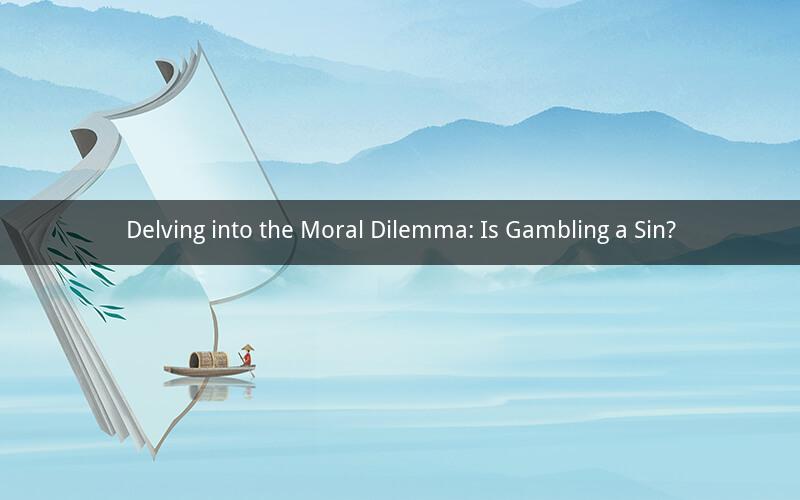
Introduction:
The debate over whether gambling is a sin has been a long-standing topic of discussion, especially within religious and moral circles. As gambling continues to gain popularity worldwide, opinions on this matter have become increasingly diverse. This article explores the various perspectives surrounding this controversy, examining religious teachings, societal impacts, and personal beliefs.
1. Religious Perspectives on Gambling:
a. Christian Viewpoint: Many Christians argue that gambling is a sin due to its potential to lead to addiction, financial ruin, and moral decay. The Bible contains passages that discourage excessive gambling and encourage wise financial decisions.
b. Islamic Viewpoint: Islam strictly prohibits gambling, considering it a major sin. The Quran explicitly states that gambling is forbidden, and Muslims are advised to avoid it altogether.
c. Jewish Viewpoint: Jewish tradition does not have a clear stance on gambling, and opinions vary among different Jewish denominations. Some argue that gambling is permissible, while others believe it can lead to negative consequences.
2. Societal Impacts of Gambling:
a. Economic Benefits: Proponents of gambling argue that it brings significant economic benefits, including job creation, tax revenue, and infrastructure development. Casinos and gambling resorts often become tourist attractions, boosting local economies.
b. Social Costs: Critics claim that gambling has detrimental social impacts, including addiction, crime, and family breakdown. Problem gamblers may experience financial hardship, mental health issues, and strained relationships.
c. Public Policy: Many governments regulate gambling to minimize its negative impacts, such as implementing age restrictions, ensuring fair play, and providing resources for problem gamblers.
3. Personal Beliefs and Values:
a. Personal Choice: Some individuals argue that gambling is a personal choice, and as long as it is done responsibly, it should not be considered a sin. They believe that people should be free to engage in activities that bring them enjoyment, as long as they do not harm others.
b. Moral Consequences: Others argue that gambling can have severe moral consequences, especially when it leads to addiction or exploitation. They believe that participating in gambling activities can lead to a decline in personal integrity and moral character.
c. Cultural Differences: Personal beliefs about gambling may also be influenced by cultural factors. In some societies, gambling is widely accepted and even celebrated, while in others, it is heavily frowned upon.
4. The Role of Science:
a. Neuroscience: Recent research in neuroscience has provided insights into the addictive nature of gambling. Studies have shown that certain brain regions, such as the reward system, are activated during gambling, making it difficult for some individuals to control their impulses.
b. Psychological Factors: Psychological factors, such as impulsivity, thrill-seeking, and stress, can also contribute to problem gambling. Understanding these factors can help in developing effective prevention and treatment strategies.
c. Public Health: Recognizing gambling as a public health issue has led to increased efforts in promoting awareness, early intervention, and treatment for problem gamblers.
5. The Future of Gambling:
a. Technological Advancements: The rise of online gambling and mobile apps has made gambling more accessible than ever before. This has raised concerns about the potential increase in problem gamblers and the need for stricter regulations.
b. Legalization and Regulation: The debate over the legalization of gambling continues, with some countries and states allowing it while others impose strict bans. Finding a balance between regulating gambling and protecting vulnerable individuals remains a challenge.
c. Ethical Considerations: As gambling continues to evolve, ethical considerations become increasingly important. This includes ensuring fair play, protecting vulnerable populations, and addressing the social impacts of gambling.
FAQs:
1. What is the main argument against gambling being a sin?
The main argument against gambling being a sin is that it is a personal choice and should not be restricted based on religious or moral beliefs. As long as individuals are responsible and do not harm others, gambling can be considered a legitimate form of entertainment.
2. Does gambling always lead to addiction?
No, not all gamblers become addicted. While some individuals may develop an addiction due to various factors, such as impulsivity and stress, many people engage in gambling without any adverse consequences.
3. How can society minimize the negative impacts of gambling?
Society can minimize the negative impacts of gambling by implementing strict regulations, such as age restrictions, mandatory self-exclusion programs, and responsible gambling campaigns. Additionally, providing resources for problem gamblers and promoting awareness about gambling addiction can help mitigate its effects.
4. What is the role of religion in the gambling debate?
Religion plays a significant role in the gambling debate by providing moral and ethical guidance on the topic. Different religious beliefs shape the opinions of individuals and communities regarding gambling, influencing public policy and individual behavior.
5. How can technology be used to combat problem gambling?
Technology can be used to combat problem gambling by developing tools that monitor and limit gambling behavior. For instance, apps and software can track gambling activity, set spending limits, and provide interventions for problem gamblers. Additionally, technology can be used to promote responsible gambling education and raise awareness about the risks associated with gambling.